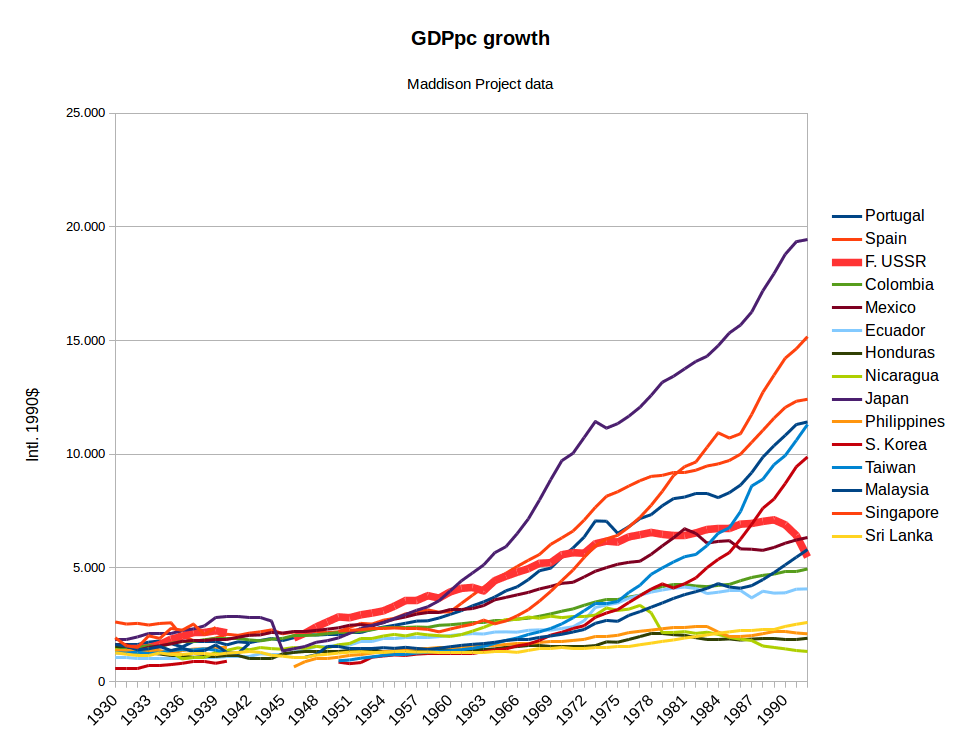- 18 Nov 2019 21:04
#15049363
We can go over a lot of things about the history of socialism. In the end though? It is really about values again. What is capitalism but its root? Capital. Capital emphasizes human beings? As the source of wealth? Not really. It is about capital. Property, owners and non owners, negotiations between workers for wages. What Nick was talking about is real. It is not some fiction about why extremely wealthy people gained even more wealth under neo-liberalism. If people believe selfishness is what creates wealth? You got the problems we got now. A total problem with income inequality.
What needs to happen is a total empowerment of the workers. They own their own labor. It is sort of happening with technology currently. Many people prefer doing their own thing rather than working for others who pay them abysmal wages. But instead of pockets of that ownership of your own labor and efforts that are isolated? You do it in big groups. You free up all that value. And you also have the freedom of democratic forms of growth within employment or work. It is a great remedy and a great progressive step forward. Mondragon that Richard Wolff toured in the Basque region of Andorra? Northern Spain? Is a good example. If you have that kind of model in thousands or millions of productive industry you transform the entire economy and the wealth grows extremely well and more than that it stabilizes employment. A big problem with those who are laid off and are without means to pay their bills once their unemployment insurance runs out.
Top down exclusivity that only favors one or two egomaniacs is not the future of employment B0ycey.
There are areas that the market doesn't do well. Those need to be run strictly by a socialist model or there is dysfunction. Health care is one of them. So is publicly funded education.
Other things that are small and great things to have in a market model are little restaurants. Like they have all over Mexico. Small, family run mom and pops that are not chains. Just local little spots that people love to patronize. Bolivians don't like McDonald's because they love doing business with micro businesses who sell traditional Andean specialties and are affordable to boot. Serve locally grown products and so on....
Many things can be sifted through to fit the needs of particular societies and their stages of development and investment. But the neoliberal nightmare of greed has to go. Forever.
B0ycey wrote:The invisible hand is merely a process. It explains why things progress and how supply is determined by demand. Ultimately it was the lack of freedom in enterprise that stagnated the SU and was why before it fell Gorbachev tried to implement Perestroika. I am not against Socialism as you know. However I don't pretend it doesn't have fundamental flaws and stagnation is one of them.
We can go over a lot of things about the history of socialism. In the end though? It is really about values again. What is capitalism but its root? Capital. Capital emphasizes human beings? As the source of wealth? Not really. It is about capital. Property, owners and non owners, negotiations between workers for wages. What Nick was talking about is real. It is not some fiction about why extremely wealthy people gained even more wealth under neo-liberalism. If people believe selfishness is what creates wealth? You got the problems we got now. A total problem with income inequality.
What needs to happen is a total empowerment of the workers. They own their own labor. It is sort of happening with technology currently. Many people prefer doing their own thing rather than working for others who pay them abysmal wages. But instead of pockets of that ownership of your own labor and efforts that are isolated? You do it in big groups. You free up all that value. And you also have the freedom of democratic forms of growth within employment or work. It is a great remedy and a great progressive step forward. Mondragon that Richard Wolff toured in the Basque region of Andorra? Northern Spain? Is a good example. If you have that kind of model in thousands or millions of productive industry you transform the entire economy and the wealth grows extremely well and more than that it stabilizes employment. A big problem with those who are laid off and are without means to pay their bills once their unemployment insurance runs out.
Top down exclusivity that only favors one or two egomaniacs is not the future of employment B0ycey.
There are areas that the market doesn't do well. Those need to be run strictly by a socialist model or there is dysfunction. Health care is one of them. So is publicly funded education.
Other things that are small and great things to have in a market model are little restaurants. Like they have all over Mexico. Small, family run mom and pops that are not chains. Just local little spots that people love to patronize. Bolivians don't like McDonald's because they love doing business with micro businesses who sell traditional Andean specialties and are affordable to boot. Serve locally grown products and so on....
Many things can be sifted through to fit the needs of particular societies and their stages of development and investment. But the neoliberal nightmare of greed has to go. Forever.
Last edited by Tainari88 on 18 Nov 2019 21:09, edited 1 time in total.
La historia de mi amor
se pudiera encontrar
en cada corazón,
en cada soledad.
Silvio Rodriguez
se pudiera encontrar
en cada corazón,
en cada soledad.
Silvio Rodriguez













 - By wat0n
- By wat0n